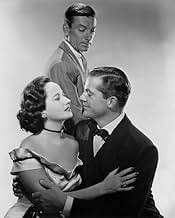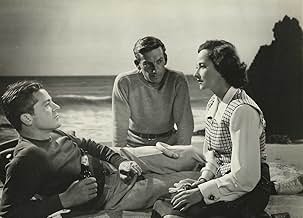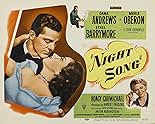NOTE IMDb
6,4/10
720
MA NOTE
Ajouter une intrigue dans votre langueWhen a beautiful socialite falls in love with an embittered composer who is blind, she feigns blindness herself in order to get closer to him.When a beautiful socialite falls in love with an embittered composer who is blind, she feigns blindness herself in order to get closer to him.When a beautiful socialite falls in love with an embittered composer who is blind, she feigns blindness herself in order to get closer to him.
- Réalisation
- Scénario
- Casting principal
- Récompenses
- 4 victoires au total
Whit Bissell
- Party Guest
- (non crédité)
Leonard Bremen
- Chez Mamie Headwaiter
- (non crédité)
Charles Cirillo
- Sailor at Chez Mamie
- (non crédité)
Angela Clarke
- Woman
- (non crédité)
George Cooper
- Bellboy
- (non crédité)
Lynn Craft
- Party Guest
- (non crédité)
Suzi Crandall
- Fur-Coated Pedestrian
- (non crédité)
Herbert Evans
- Butler
- (non crédité)
Avis à la une
If you ask me, this film seems undervalued or under-appreciated. I don't know why. RKO's NIGHT SONG stars Dana Andrews as a blind pianist and Merle Oberon as the woman who loves him. The music is wonderful, and while the plot is full of melodramatic complications and a liberal amount of hokum, it still manages to entertain and engage the audience because the characters are well-drawn and well played. The film boasts the added bonus of having Ethel Barrymore and Hoagy Carmichael in the supporting roles.
In some ways, NIGHT SONG reminds me of MAGNIFICENT OBSESSION, where Irene Dunne (or Jane Wyman, take your pick) experiences blindness and manages to find love in an unlikely source.
While not considered an 'essential' (in the TCM sense of the word), NIGHT SONG is a studio film that is very well put together and succeeds on many levels.
In some ways, NIGHT SONG reminds me of MAGNIFICENT OBSESSION, where Irene Dunne (or Jane Wyman, take your pick) experiences blindness and manages to find love in an unlikely source.
While not considered an 'essential' (in the TCM sense of the word), NIGHT SONG is a studio film that is very well put together and succeeds on many levels.
Bearing more than a distant resemblance with "magnificent obsession" ,Stahl's tear jerker of the thirties (remade by Douglas Sirk in the fifties )"Night Song " is less melodramatic ,but ,mainly in its second part ,drags on a little bit;the movie features two real life musicians :Arthur Rubinstein in the flesh ,and Hoagy Carmichael whose songs were covered even by Beatle George Harrison ("Baltimore Oriole"," Hong Hong Blues) and his influence shows in McCartney's song "baby's request" .
Dana Andrews is reliable as ever ,and Madame Barrymore provides good support (dig the line when she tells her niece that all she wants is peace);Merle Oberon's playing is a bit emotionally remote ;the music is omnipresent ,classical stuff or Carmichael's "monkey song" .But the story itself is a bit derivative.
Dana Andrews is reliable as ever ,and Madame Barrymore provides good support (dig the line when she tells her niece that all she wants is peace);Merle Oberon's playing is a bit emotionally remote ;the music is omnipresent ,classical stuff or Carmichael's "monkey song" .But the story itself is a bit derivative.
10whpratt1
This was a very outstanding film for viewers who loved Merle Oberon, Dana Andrews, Ethel Barrymore and Hoagy Carmichael during the height of their careers in 1948. In this film, Cathy,(Merle Oberon),"The Broken Melody",'34, a rich woman who falls deeply in love with Dana Andrews,(Dan),"The Best Years of Our Lives",'46, who is blind and is a down and out piano player and composer. Dan has a great pal who is also a musician and they work and live together in a Jazz club and try to make ends meet. Dan's buddy is Hoagy Carmichael,(Chick),"To Have & Have Not",'44 who gives a great supporting role and is quite funny through out the entire picture. There is plenty of Classical music and a great appearance of a famous conductor and pianist. The is lots of romance, drama and comedy and a very unusual ending.
The job of a movie is to give the audience members a bigger slice of life than they would normally experience. Night Song, a classic movie of the post-war 1940's, gives that slice of life with rare grace, elegance and style. Critics have panned it because of the "bad" far-fetched plot, the "bad" music, and "bad" acting.
I like this movie because, quite coincidentally, I personally have digested many of the slices of life in the "far-fetched" plot. The movie is about a piano player/composer who is struck on the head in the prime of his life. I am a piano player/composer who was struck on the head in the prime of my life. We both made it through a war era untouched, he WWII, and I Vietnam, well almost. He is living hand to mouth with his best friend. I am also living hand to mouth with my best friend, my wife. For those who love far-fetched coincidences: The composer's last name is Evans—my grandfather's name before he changed it. The movie was probably shot in 1946, the year I was born. Exactly 20 years later I saw Artur Rubenstein, who acted and performed in this movie, in a concert at the Music Center in Los Angeles--the only time I ever went to such a concert. It opened in Sweden on my birthday. What could be more far-fetched?. The not so far-fetched plot twists were not lost on me. As I watched, I was saying to myself, "What is possible for me? Miracles happen every day! Every success story was improbable before it happened!" After watching the film, I went over to the piano and played my own unfinished concerto once again!
As for the Leith Stevens music, if you didn't like it, say so. If it didn't touch you, say so. I liked it, immensely. It touched me immensely! If you want a thrill, type in Leith Stevens on IMDb. You'll find page after page of musical credits—right up to 2005! The man is a modern master composer played by the greatest performers of that time in this movie! Not bad for "bad" music! The job of film critics is to say what they like and dislike about films and why. They should leave all categorical good and bad thoughts completely out of the conversation.
One measure of the talent of an actor, and some say the only measure of a film, is the ability to transport the mind and the spirit of the viewer to another time and place. I was completely transported by this movie. I was perfectly comfortable with ALL the performances, by some of the most distinguished actors of the era, because I was ready, willing and able to be transfixed; and this film is transfixing! Let's get it on DVD!
I like this movie because, quite coincidentally, I personally have digested many of the slices of life in the "far-fetched" plot. The movie is about a piano player/composer who is struck on the head in the prime of his life. I am a piano player/composer who was struck on the head in the prime of my life. We both made it through a war era untouched, he WWII, and I Vietnam, well almost. He is living hand to mouth with his best friend. I am also living hand to mouth with my best friend, my wife. For those who love far-fetched coincidences: The composer's last name is Evans—my grandfather's name before he changed it. The movie was probably shot in 1946, the year I was born. Exactly 20 years later I saw Artur Rubenstein, who acted and performed in this movie, in a concert at the Music Center in Los Angeles--the only time I ever went to such a concert. It opened in Sweden on my birthday. What could be more far-fetched?. The not so far-fetched plot twists were not lost on me. As I watched, I was saying to myself, "What is possible for me? Miracles happen every day! Every success story was improbable before it happened!" After watching the film, I went over to the piano and played my own unfinished concerto once again!
As for the Leith Stevens music, if you didn't like it, say so. If it didn't touch you, say so. I liked it, immensely. It touched me immensely! If you want a thrill, type in Leith Stevens on IMDb. You'll find page after page of musical credits—right up to 2005! The man is a modern master composer played by the greatest performers of that time in this movie! Not bad for "bad" music! The job of film critics is to say what they like and dislike about films and why. They should leave all categorical good and bad thoughts completely out of the conversation.
One measure of the talent of an actor, and some say the only measure of a film, is the ability to transport the mind and the spirit of the viewer to another time and place. I was completely transported by this movie. I was perfectly comfortable with ALL the performances, by some of the most distinguished actors of the era, because I was ready, willing and able to be transfixed; and this film is transfixing! Let's get it on DVD!
This film predates my birth by ten years, but after just seeing it on TCM, I had to weigh in. Overlong? ...well probably, and certainly contrived, given the plot. But somehow, it works, and does so beautifully.
Both Andrews and Oberon do the best they can with their characters: he, a blind pianist playing in dives; she, a wealthy socialite who likes to go slumming. Enamoured by him, she feigns blindness in order to insinuate her way into his bitter existence. Both Hoagy Charmichael and stalwart Ethel Barrymore add comic bite and the requisite amount of wisdom as they lend their support to the ruse. And there are some cleaver twists which keep the game running just when one would think they would otherwise send it careening off the tracks. And it's hard for me to think of another film in which Merle Oberon was more beautiful.
Set your reality check to its lowest setting and enjoy this classic sudser. And, if you're not a fan of classical music, this film just might change that!
Both Andrews and Oberon do the best they can with their characters: he, a blind pianist playing in dives; she, a wealthy socialite who likes to go slumming. Enamoured by him, she feigns blindness in order to insinuate her way into his bitter existence. Both Hoagy Charmichael and stalwart Ethel Barrymore add comic bite and the requisite amount of wisdom as they lend their support to the ruse. And there are some cleaver twists which keep the game running just when one would think they would otherwise send it careening off the tracks. And it's hard for me to think of another film in which Merle Oberon was more beautiful.
Set your reality check to its lowest setting and enjoy this classic sudser. And, if you're not a fan of classical music, this film just might change that!
Le saviez-vous
- AnecdotesDana Andrews wore opaque contact lenses throughout filming to give him a realistic sensation of blindness.
- GaffesWhen Chick begins singing the verses on the song "Who Kill Er", you hear horn riffs playing in the background. But when it cuts to the horn players on stage, they are sitting still and not playing although you can hear the horns in the music.
- Citations
Miss Willey: My heart's an old wastepaper basket, filled with unpaid bills and paperback novels.
- ConnexionsFeatured in Let's Go to the Movies (1949)
- Bandes originalesI COULDN'T SLEEP A WINK LAST NIGHT
(uncredited)
from Amour et swing (1943)
Music by Jimmy McHugh
Performed by "Chick Morgan Band"
Meilleurs choix
Connectez-vous pour évaluer et suivre la liste de favoris afin de recevoir des recommandations personnalisées
- How long is Night Song?Alimenté par Alexa
Détails
- Date de sortie
- Pays d’origine
- Langue
- Aussi connu sous le nom de
- Mi corazón te guía
- Lieux de tournage
- Broad Beach, Malibu, Californie, États-Unis(aka Trancas Beach - beach scenes)
- Sociétés de production
- Voir plus de crédits d'entreprise sur IMDbPro
Box-office
- Montant brut aux États-Unis et au Canada
- 1 700 000 $US
- Durée
- 1h 42min(102 min)
- Couleur
- Rapport de forme
- 1.37 : 1
Contribuer à cette page
Suggérer une modification ou ajouter du contenu manquant






































